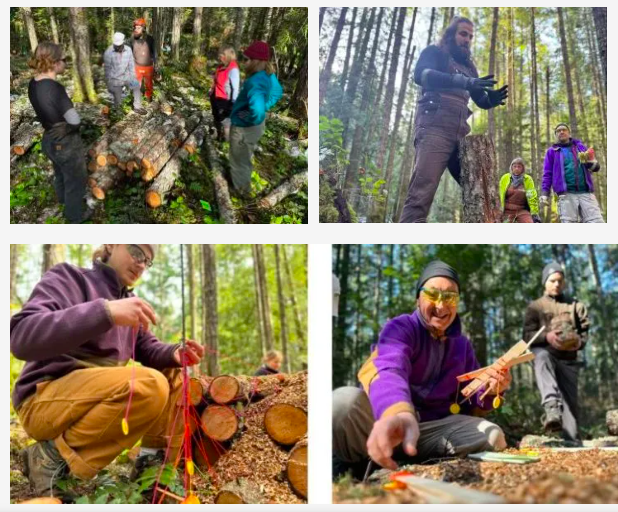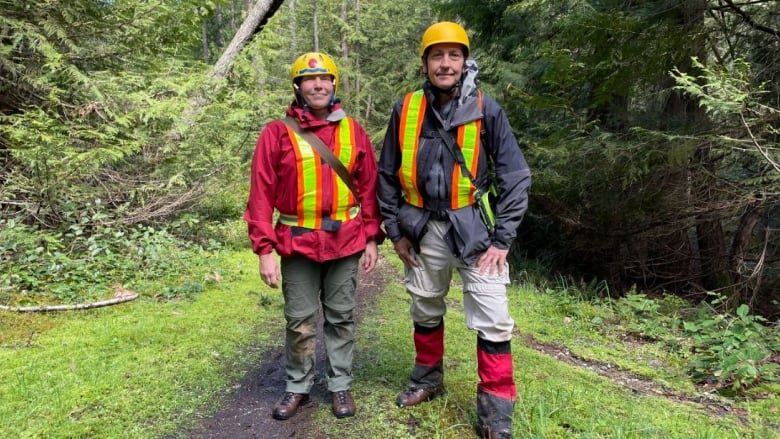CLIMATE RESEARCH & RESTORATION ON SALT SPRING ISLAND
CLIMATE ADAPTATION RESEARCH LAB (CARL)
The Climate Action Research Lab (CARL) is Transition Salt Spring’s hub for ecological restoration, climate adaptation research, and community learning. Grounded in science and powered by local collaboration, CARL focuses on restoring the health of our island ecosystems—starting with the Hwmet’utsun (Mt. Maxwell) Creek Watershed, a vital water source for thousands of islanders.
Through groundbreaking research, education and outreach initiatives in fire risk reduction, wetland restoration, and forest health management, the team is raising awareness and empowering individuals and organizations to take action to protect their communities.


Restoring Ecosystems for a Resilient Future
Educational Initiatives: CARL actively involves local youth in environmental stewardship. Notably, students from Gulf Islands Secondary School (GISS) and the University of Victoria's Restoration Program have participated in hands-on restoration projects within the Hwmet’utsum (Mt. Maxwell) Creek Watershed. These experiences provide students with practical knowledge about forest health and the impacts of climate change.
Ecological Restoration: In response to historical land use that has led to ecosystem degradation, CARL focuses on restoring native plant communities and wetland areas. Efforts include efforts to slow water flow, reduce erosion, and enhance habitats for native species in the Hwmet’utsum (Mt. Maxwell) Creek Watershed. Such interventions aim to improve the watershed's ability to retain water, increasing resilience to drought and reducing wildfire risks.
Understanding fire in our region
Data Collection and Monitoring: To inform restoration strategies, CARL has established long-term monitoring sites across the Maxwell Creek Watershed. These sites collect hydrological data and assess forest conditions, enabling the identification of environmental change and areas with high restoration potential. The data supports better ecosystem understanding and targeted interventions to reduce fire hazards and enhance water quality.
Community Outreach and Knowledge Sharing: Recognizing the importance of community involvement, CARL engages local residents through workshops, webinars, and collaborative projects. By sharing findings and best practices, CARL fosters a community of practice aimed at promoting ecological integrity and climate adaptation across the region.

CARL RESOURCES
FIELD NOTES
Celebrating 2,000+ Native Plants Planted!
🌿A heartfelt THANK YOU to everyone who joined us in the field for our spring and fall planting days this year – and to all who donated plants, offered support, or helped behind the scenes….
Climate Adaptation Research Lab – Restoring the Maxwell Watershed with North Salt Spring Waterworks District.
Climate Adaptation Research Lab – Restoring the Maxwell Watershed with North Salt Spring Waterworks District Watch this short and brilliant 5-minute video. It describes why we are doing our work in the watershed. GISS students…
TSS’s CARL project among finalists announced for 2023 Nature Inspiration Awards
Announced in Financial Post Sept 12, 2023 OTTAWA, Sept. 12, 2023 (GLOBE NEWSWIRE) — The Canadian Museum of Nature is pleased to announce the finalists and the Lifetime Achievement recipient for its 2023 Nature Inspiration…
Building Climate Resilience
Dr. Ruth Waldick on Extreme Heat, Fire, and Climate Resilience in the Coastal Douglas-Fir Region
We’re proud to share that Dr. Ruth Waldick, Lead Scientist with Transition Salt Spring and head of the Climate Adaptation Research Lab (CARL), is featured in a new University of Victoria podcast exploring how our…
Maxwell Creek Planting Days – October 17 & 18
The Climate Adaptation Research Lab is calling on your green thumbs and gardening expertise once again! This past spring, thanks to the incredible efforts of our volunteers, we successfully planted hundreds of native species in…
Protecting What Makes Salt Spring Unique: Our Forest Biodiversity
Salt Spring is home to a wide variety of ecosystems and habitats that are intricately interconnected. Nutrients from the Salish Sea — carried inland by birds of prey, otters, and other predators — feed the…
Youth Education
Ecological Monitoring and Data Analysis Intern Wanted
Job Title: Ecological Monitoring and Data Analysis Intern Application Deadline: Nov 22nd Description/Opportunity Transition Salt Spring Society’s Climate Adaptation Research Lab (C.A.R.L.) is a long-term experimental watershed restoration program based in the Maxwell Creek watershed…
Wildhaven and Transition Salt Spring: C.A.R.LY. Stewardship Immersion Program
Wildhaven and Transition Salt Spring have partnered to create an early eco-literacy nature immersion program on Salt Spring Island. This video shares from the first 6 months of our pilot project, which is a weekly…
Nature’s Classroom: Wild Haven Kids Learn How Forests Can Defend Against Wildfires
On June 14th, 2023, a group of students from the homeschool group Wild Haven spent the day in the field with our lead scientist Ruth Waldick, restoration ecologist Grace Fields, and botanist/restoration ecologist Angeline Emmott….
Fire Resources
Dr. Ruth Waldick on Extreme Heat, Fire, and Climate Resilience in the Coastal Douglas-Fir Region
We’re proud to share that Dr. Ruth Waldick, Lead Scientist with Transition Salt Spring and head of the Climate Adaptation Research Lab (CARL), is featured in a new University of Victoria podcast exploring how our…
Maxwell Creek Planting Days – October 17 & 18
The Climate Adaptation Research Lab is calling on your green thumbs and gardening expertise once again! This past spring, thanks to the incredible efforts of our volunteers, we successfully planted hundreds of native species in…
When Fire Meets Water: Healthy Watersheds as a Solution for the 21st Century
Rethinking Fire in Our Watersheds In the first webinar of the Fire Files series, “When Fire Meets Water: Healthy Watersheds as a Solution for the 21st Century,” experts explored how wildfires, water, and watershed health…
COMMUNITY IMPACTS
CARL is strengthening community connections and ecosystem health while helping Salt Spring build climate resiliency. Through hands-on restoration, collaboration, and shared learning, CARL is creating lasting impacts for people and nature.





WHAT OUR COMMUNITY IS SAYING
"I was inspired to learn about Transition Salt Spring's Climate Adaptation Research Lab. The forest restoration project hits all the right buttons - help a watershed, reduce fire risk, increase forest resilience and engage GISS youth. All that by 'assembling' nurse logs to mimic fallen old-growth trees. I've made a nurse log on my property, and it's so much easier and better than burning slash."
- STEVE NEW
PROJECT PARTNERS
This project is possible thanks to our CARL staff and dedicated team of community and research contributors across the Salish Sea. Project funding has been provided for our projects by: Environment and Climate Change Canada, Eco-Canada intern and staff support, North Salt Spring Waterworks District, Salt Spring Water Preservation Society, University of British Columbia (Forestry), BC Ministry of Transportation, Capital Regional District (SSI), Pacific Institute for Climate Solutions, and the early support for our vision from a private donor on island.





























